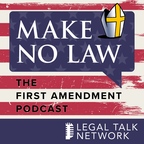
Make No Law: The First Amendment Podcast
Summary: Ken White explores the background of important First Amendment cases and the personalities and history that led to them. Join Ken, First Amendment litigator and law blogger at Popehat.com, as he interviews some of the people behind America’s most important free speech cases.
- Visit Website
- RSS
- Artist: Legal Talk Network
- Copyright:
Podcasts:
Ken White explores how the First Amendment has handled inflammatory speech, from Schenck to the current Brandenburg standard and all the way up to today.
Host Ken White dives into the famously ambiguous obscenity standards set forth by the United States Supreme Court.
Host Ken White looks at the legal bases of arguments made by critics of social media sites moderation and shows why Twitter, Facebook, and Youtube bans are legally protected.
Criminal or civil, plaintiff or defendant — what’s the one piece of legal advice all should follow? Shut up! That being said, should a judge be able to make you do this?
On April 26, 1968, Paul Robert Cohen walked down the corridor of the Los Angeles County Courthouse at the corner of Grand and 1st. He didn’t start a fight, he didn’t make any threats, he didn’t even hold up a sign, but he did wear a jacket. This jacket featured “STOP THE WAR,” two peace signs, and the phrase “FUDGE THE DRAFT” (only it didn’t say “fudge”). The result was a court battle over whether the government has the power to punish the use of the word fuck because many find it offens
Host Ken White answers common questions his listeners have about freedom of speech and the First Amendment. He addresses the misleading claim that “hate speech is not free speech,”, explains the case that challenged President Trump’s ability to block people on Twitter, and talks about how anti-SLAPP statutes work. Ken also takes advantage of the opportunity to discuss yelling on the internet and the constitutional right to petition the government.
Fighting Faiths
“You can’t yell ‘fire’ in a crowded theater” is one of the most commonly used First Amendment catchphrases -- but does it really support exceptions to free speech? The answer to this question can be found in the writings of Supreme Court Justice Oliver Wendell Holmes. He penned the phrase in 1919, not to justify moderate limits on speech, but to justify government prosecution of those speaking out against the draft.
In June of 1966, Sidney Street heard the news that James Meredith, an icon of the Civil Rights Movement, had been shot on the second day of his March Against Fear. Street, an African American himself, burned the flag and was arrested. Street declared, “If they let that happen to Meredith, we don’t need an American flag.” So sparked the question of whether the government can punish someone for using words to defile or disrespect an American flag.
The Animal Crush Video Prohibition Act of 2010 was an animal cruelty prevention law aimed at videos showing women in high heels crushing small animals. But it ended up being used to target Robert Stevens instead. United States v. Stevens is a landmark case that may be the most important First Amendment decision of the 21st Century so far. We examine the case and the question of whether the government can continually come to the Supreme Court with potential exceptions to the First Amendment.
Simon Tam named his band “The Slants” as a form of self empowerment, but ran into problems when he tried to tried to register the name as a trademark, and ended up taking the case to the Supreme Court. We examine the Matal v. Tam case in which the Supreme Court vindicated Simon Tam and The Slants, finding that Section 2(a) of the Lanham Act -- which allows the PTO to deny trademarks it finds offense -- violates the First Amendment.
When Richard Ceballos, a deputy district attorney in Los Angeles County, expressed concern about the validity of a search warrant in 2000, he discovered the fuzzy line between free speech rights and the need for government entities to maintain workplace discipline. Ken White explores the Garcetti v. Ceballos case, the results of which saddle government employees with a tough decision when reporting misconduct to their superiors.
In late 1965, a 13-year-old student named Mary Beth Tinker was suspended for wearing a black armband to school to support a truce in the Vietnam war. Through her parents, Mary sued the school. Ken White, alongside Mary Beth Tinker herself, dives into the Tinker v. Des Moines case and how it has impacted freedom of speech for students on campuses today. While Mary Beth Tinker’s rights were upheld, many plaintiffs in First Amendment cases since have faced less sympathetic courts.
On April 6, 1940, a Jehovah's Witness named Walter Chaplinsky was arrested for yelling, “You are a God damned racketeer and a damned Fascist and the whole government of Rochester are Fascists or agents of Fascists” at a Rochester, New Hampshire police officer. The confrontation launched the case Chaplinsky v. New Hampshire, which made it all the way to the Supreme Court. The Court ruled against Chaplinsky, articulating an exception to the First Amendment for so-called “fighting words.”